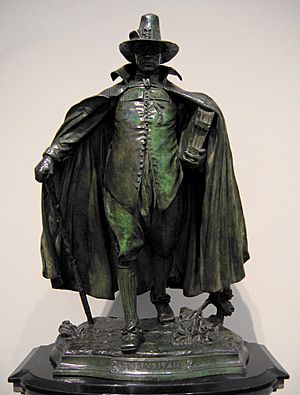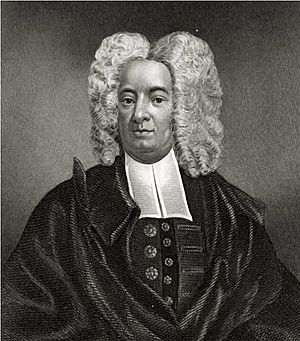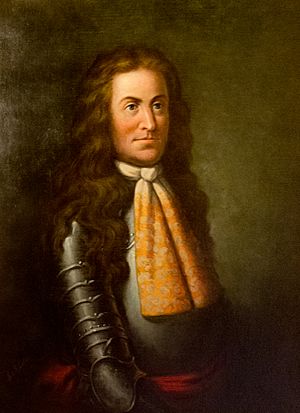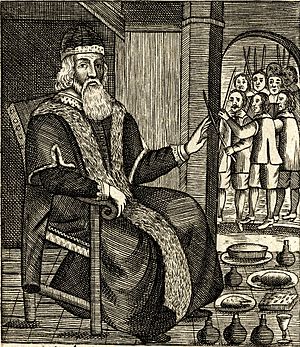Christmas in Puritan New England facts for kids
Christmas wasn't always a big celebration in New England! For a long time in the 1600s, celebrating Christmas was actually against the law or just not done in places settled by a group called the Puritans. They didn't find anything in the Bible that said they should celebrate Christmas. They also thought that many Christmas traditions came from old pagan customs and were a form of worshiping false things. Back then, Christmas in England could be a bit wild, like a big party with people acting silly.

In the early days of the Plymouth Colony, some people who weren't Puritans tried to celebrate. Governor William Bradford had to tell them off! Laws in England even tried to stop Christmas celebrations for a while. But even after these laws were removed, the Puritan way of thinking about Christmas stayed strong in New England. People still didn't celebrate it much, even though it was legal again.
However, by the mid-1700s, Christmas started to become a more common celebration in New England. By the early 1800s, even ministers from the Congregational churches (the Puritans' church) began to ask people to celebrate Christmas in their churches. When Christmas became a federal holiday in the United States in 1870, it started to look a lot more like the Christmas we know today. It became a time for shopping, thinking about spiritual things, and remembering good times.
Why Puritans Didn't Celebrate Christmas
The Puritans had very strong feelings about Christmas. Historian Bruce Colin Daniels explains that Christmas was a big topic during the Protestant Reformation in Europe. Many groups, including the Anabaptists, Quakers, and Congregational and Presbyterian Puritans, thought Christmas was wrong. But other groups like Anglicans, Lutherans, and Roman Catholics celebrated it.

The Puritans called Christmas 'Foolstide' and tried to stop any celebrations. They had a few main reasons:
- They believed the Bible only allowed the Sabbath (Sunday) as a holy day.
- They thought Christmas celebrations often involved bad behavior. A famous Puritan leader named Cotton Mather spoke out against these actions.
- They also believed that December 25th wasn't the true birth date of Jesus. They argued that early Christians chose this date to take over an old Roman festival. So, celebrating Christmas on December 25th felt like honoring a pagan custom to them. This Puritan view was very common in New England for nearly 200 years.
The Puritans had a very busy calendar. They worked about 300 days a year, which was a lot more than people in other cultures. Days off were rare, mostly just the Sabbath, election day, and special days for prayer or thanks. People who weren't Puritans in New England missed the holidays that workers in England enjoyed.
The Pilgrims, who were Puritans, showed how much they disliked Christmas in 1620. On their first Christmas Day in the New World, they spent the day building their first structure. This showed they had no respect for the holiday.
A year later, on December 25, 1621, Governor William Bradford led a group to work in the forest. He found that some new settlers didn't want to work on Christmas Day. Bradford wrote in his history book, Of Plymouth Plantation:
On the day called Christmas Day, the Governor called [the settlers] out to work as was usual. However, the most of this new company excused themselves and said it went against their consciences to work on that day. So the Governor told them that if they made it [a] matter of conscience, he would spare them till they were better informed; so he led away the rest and left them.
When Bradford and his group came back at noon, they found those who stayed behind playing games like stool-ball. Bradford took their game equipment away. He told them off and said they couldn't have any more parties in the streets. He said their devotion for the day should only happen in their homes.
The colonies of Massachusetts and Connecticut also refused to allow Christmas celebrations. When the Puritans gained power in England, they passed a law in 1647 stopping the celebration of Christmas, Easter, and Whitsuntide. New England Puritans then made their own laws making Christmas celebrations illegal for part of the 1600s. A Massachusetts law in 1659 even fined people five shillings if they celebrated Christmas.
Christmas Becomes Legal Again
Laws against celebrating Christmas were removed in 1681. But many strong Puritans still thought the day was wrong. In the 1700s, people in New England saw Christmas as a symbol of royal power, outside interference, bad behavior, and something that got in the way of their religious mission.

For example, when Anglican Governor Sir Edmund Andros was in charge (from 1686 to 1689), his government closed shops in Boston on Christmas Day. He even forced the schoolmaster out of town for a holiday. But after Andros was removed from power, the Puritan view returned. Shops stayed open on Christmas, and people brought goods like hay and wood into Boston, just like any other workday.
Because Christmas was seen so negatively, people who weren't Puritans in colonial New England didn't try to celebrate it much either. Many just spent the day quietly at home. In 1771, a schoolgirl named Anna Winslow wrote in her diary in Boston, "I kept Christmas at home this year, and did a good day's work."
Even though Christmas celebrations were legal after 1680, New England officials still didn't like gift-giving or parties. Decorating with evergreens, which was linked to pagan customs, was not allowed in Puritan churches and discouraged in homes. People who celebrated loudly could even be punished for disturbing the peace.
However, Christmas traditions didn't completely disappear. They "hovered just beneath the surface of New England culture." There are records of some Christmas disruptions in the late 1600s and early 1700s.
Christmas slowly started to become more accepted in the 1700s. Even Cotton Mather's sermon in 1712, which was against bad behavior during Christmas, suggested that celebrating it might be okay. By the 1730s, some sermons actually encouraged Christmas as a joyful time. A few almanacs started mentioning Christmas in 1713, and by the 1760s, it was common. Christmas poems and music also began to appear in New England newspapers.
The first public call for a church Christmas celebration by a Congregationalist came in 1797. Other churches like the Universalists and Unitarians also started holding Christmas services and asking for businesses to close. By 1808, advertisements for Christmas gifts began to appear. This shows that the commercial side of Christmas was starting to grow.
A new poem written in 1822 helped shape how Christmas was celebrated in many American homes. This poem, which became very popular, was called 'A Visit from St. Nicholas.' It focused on Santa Claus, not the religious story of Christmas. Santa Claus helped change Christmas from a time of wild parties to a day of quieter family fun.
In 1856, Christmas became a public holiday in Massachusetts. Even as late as 1870, Boston public schools had classes on Christmas Day. Children who stayed home to be with their Christmas trees were sometimes punished. Some people even joked that the Puritans saw Santa Claus as the Anti-Christ!
After the American Civil War, Christmas became a very important holiday in America. It became a Federal holiday in 1870 under President Ulysses S. Grant. This was partly to help unite the country after the war. During the 1800s, the Puritan dislike for Christmas slowly faded. By the late 1800s, writers praised Christmas for being generous, bringing families together, and being joyful. For example, in 1887, St. Nicholas Magazine published a story about a sick Puritan boy who got better when his mother brought him a Christmas tree branch.
Some people even suggested that the Puritans had done Christmas a favor by stopping the gambling, drinking, and wild sports that used to be part of its celebration. When these less pleasant parts were removed, Americans were able to create a new Christmas that fit their own times. The ideas that made Puritans dislike Christmas changed. Christmas in the late 1800s became a mix of spiritual meaning, shopping, crafts, good memories, and hope.


